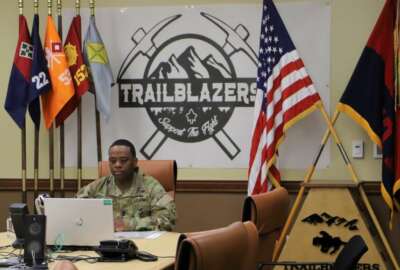GAO delivers a tough review of the VA’s Community Care Program
In today's Federal Newscast, the GAO offers a stark assessment of the VA's community care program, political appointees will now have a major role in diversity ...
To listen to the Federal Newscast on your phone or mobile device, subscribe in PodcastOne or Apple Podcasts. The best listening experience on desktop can be found using Chrome, Firefox or Safari.
- The Department of Veterans Affairs lacks clear standards for how long veterans should be waiting for community care. The Government Accountability Office offered a stark assessment of VA’s community care program. GAO said VA does not have clear timeliness metrics for VA community care providers. Few providers are using VA’s new software to exchange health data with agency medical centers. And few VA medical centers have enough employees to staff and oversee the community care program. Congress is expected to review GAO’s recommendations at a hearing tomorrow.
- A federal judge ordered the Census Bureau to keep 2020 field operations running through the end of October, but the Commerce Department has other plans. Secretary Wilbur Ross said the bureau will now wrap up field operations on October 5. House Oversight and Reform Committee Chairwoman Rep. Carolyn Maloney (D-N.Y.) said Commerce’s timeline increases the risk of an undercount of demographics the bureau has not gotten to yet. The bureau said it has counted nearly 98% of households in the US so far.
- Small businesses have a chance to tell the General Services Administration how to move forward with its new small-business multiple-award contract. GSA is seeking feedback on two different paths. The first will be similar to the Alliant 2 Small Business approach, with one platform that gives agencies the ability to set-aside individual task orders. The second strategy would award three separate platforms: a total small-business set-aside, a women-owned small-business set-aside, and a HUBZone set-aside.
- Political appointees will be in charge of deciding what diversity and inclusion training should stay or go at federal agencies. Agencies are supposed to choose one appointee to oversee implementation of the president’s new executive order on diversity and inclusion training. The EO bans certain training the Trump administration deems “divisive.” New guidance says agencies can still implement in-house and external diversity and inclusion training. But it is up to the appointees to decide whether it meets the administration’s guidelines. Federal employees who move forward with training deemed divisive will be subject to discipline. (Federal News Network)
- The Army has a new diversity policy, but certain societal realities make change an uphill battle. The Army’s new diversity policy extends mentorship to younger minorities and it looks at almost every facet of the Army for bias. However, changing the fact that there are 11 times more white officers in senior positions than minorities may take more than just the Army to fix. Experts said issues affecting minorities like criminal records and obesity, caused by increased police patrolling and food deserts, also hinder minorities from succeeding in the military. Analysts said it will take a whole-of-government and societal approach for military leadership to look more like the make up of the United States. (Federal News Network)
- 2020 has seen a significant uptick in military suicides. Army officials said they have a 30% increase since the same point in 2019. The Pentagon has not yet released DoD-wide figures, but an analysis by the Associated Press found suicide rates across all the services are likely 20% higher than last year. Army leaders said they cannot definitively tie the increases to COVID-19, but there are clear correlations between the start of the pandemic and an increase in behavioral health issues among servicemembers. (Federal News Network)
- Another piece of the CMMC puzzle drops today. The Defense Department issued an interim rule to implement one of the last remaining major pieces of the Cybersecurity Maturity Model Certification or CMMC program. The acquisition regulation adds more clarity around the implementation timeline and around the requirements contractors will have to adhere to. For example, the interim rule requires vendors working at medium- or high-security levels to undergo an assessment by the government of how it complies with the standards outlined in NIST Special Publication 800-171. The clause also requires vendors to achieve CMMC certification by the time DoD makes a contract award. DoD will roll out the CMMC program over the next five years.
- A third federal court judge halted changes for the Postal Service. In a lawsuit filed by the state of New York, a district court judge has filed a preliminary injunction preventing the Postal Service from moving ahead with plans to limit late and extra trips between mail processing plants and post offices. The judge said the agency should have requested an advisory opinion from the Postal Regulatory Commission before implementing the changes. In a separate lawsuit, the Postal Service is asking another federal judge to narrow his ruling to pre-approve all necessary overtime about a week before Election Day. (Federal News Network)
- A bipartisan group of senators would like to make it easier for federal firefighters to trade shifts without incurring penalties to their pay or leave. State and local firefighters can trade shifts on their own without intervention from their supervisors through a provision in the Fair Labor Standards Act. But federal firefighters don’t have that flexibility without dealing with changes to their pay and annual leave. Sens. Chris Van Hollen (D-Md.), Jon Tester (D-Mont.), Tom Carper (D-Del.) and Susan Collins (R-Maine) say their bill would extend the trade-time flexibility to federal firefighters.
- Every four years the best talents in sports get together to compete. This year, the Air Force is trying to bring together the best minds in advanced manufacturing, using cutting-edge technologies to make goods. The service’s rapid sustainment office is hosting its inaugural advanced manufacturing Olympics. The virtual experience will bring together businesspeople, subject matter experts, and academia for tech challenges to make technology and prototypes that are more cost effective. Another event will test the strength of materials used in manufacturing.
Copyright © 2024 Federal News Network. All rights reserved. This website is not intended for users located within the European Economic Area.
Peter Musurlian
Peter Musurlian is a producer at Federal News Network.
Follow @PMusurlianWFED





